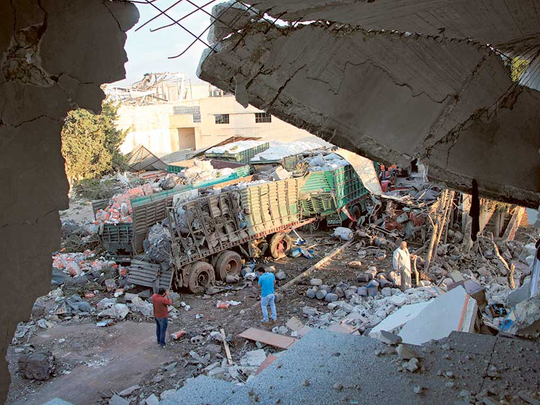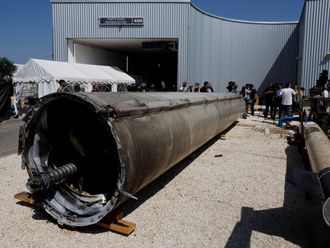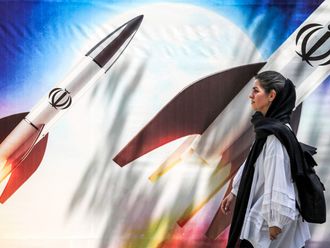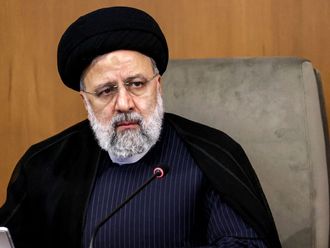
Beirut: The US-Russian agreement on Syria ceasefire, reached ahead of the Eid Al Adha holidays on September 9, has officially collapsed. None of its confidence-building measures have been achieved, and the much-publicised “national ceasefire”, which went into effect on September 12, has also been shattered with 300 alleged violations over the past eight days.
Throughout Syria, violence has surged in the past 48 hours as warring factions return to the trenches — glad to see the end of an agreement reached on their behalf by the two powers, although none of them were officially consulted.
On Monday night, the Syrian Army issued an official statement announcing the end of the truce orchestrated by the US and Russia, in direct response to a coalition air strike on the city of Deir Al Zor along the Euphrates River on Saturday, which led to the killing of at least 60 government troops. It embarrassed the Russians before their Syrian allies and killed whatever appetite they might have had for cooperation and political concessions.
Moscow was furious about the attack, although it has officially been proclaimed a “mistake” by the United States, and is trying to assemble an emergency session at the UN to condemn the US government, claiming that this attack only facilitates the advances of the so-called Daesh on the Euphrates.
Within the upper echelons of the Kremlin, however, officials are saying that this raid was signed off by Defence Secretary Ashton Carter, who has strongly voiced his opposition to the US-Russian deal, reached eleven days ago by his colleague, Secretary of State John Kerry. He made his reservations loud and clear in a five-hour conversation between Kerry and senior US officials after the deal was reached, and is trying to bring it down, the Russians are claiming.
Carter believes that the US was giving too much to Moscow in exchange for little cooperation from President Vladimir Putin, who has refused to budge on the future of his ally, President Bashar Al Assad or on that of a proper political transition. Others in the Obama Administration are arguing that the deal must never pass because it is illegal, citing a 2014 law in Congress that prevents the United States from cooperating militarily with the Russians until Putin ends his occupation of Crimea. Because of the major differences within the administration, many Russian officials see the strike on Deir Al Zor as more of an internal US feud, between John Kerry and Ashton Carter, than a strong-worded message to Moscow.
Additionally, the deal collapsed because of a number of unkept promises, which perhaps empowered its critics in Washington DC. First, they claim that Moscow is still insisting that the Turkish-backed Ahrar Al Sham in the Syrian north and the Saudi-backed Jaysh Al Islam in the Damascus countryside are terrorist organisations that need to be excluded from the political process. The Russians have labelled both groups as “terrorist organisations” although US administration officials have looped them as part of the “moderate armed opposition”. Last July, Kerry showed readiness to part ways with Ahrar Al Sham and Jaysh Al Islam, claiming that the two Salafist groups “are subgroups underneath Daesh and Jabhat Al Nusra”.
This was music to the ears of the Russians, who read his statement as a clear surrender to Lavrov’s vision of the Syrian battlefield. If designated officially as subgroups to Al Qaida, after all, this would give the Russian Air Force the political, military, and legal cover to strike at these groups, although many of their fighters have been armed and trained by the Americans and their Turkish and Gulf allies. Both the Pentagon and the CIA see promise in both Ahrar Al Sham and Jaysh Al Islam, killing whatever hopes Lavrov may have had at seeing their speedy demise after reaching his agreement with Kerry.
Another stumbling block was the delivery of UN aid to the besieged city of Aleppo. Given his inability at doing something cohesive to bring the war to a halt, Obama had focused on small steps of confidence building that would ease human suffering and gradually reduce the level of violence and restore both parties to the negotiating table in Geneva.
One of them was opening humanitarian corridors and bringing humanitarian aid to Aleppo. The Russians had promised to demilitarise the city’s main entry point, known as the Castello Road, and to withdraw government troops and their heavy weapons to a distance of 3.5km, so that the goods could pass through. The forty trucks of UN goods, which were supposed to reach 80,000 civilians in opposition-held parts of eastern Aleppo, were supposed to have entered the city from the Bab Al Hawa gateway on the Turkish border, with safe passage and no hindrance from the Syrian Army. Only Russian troops were supposed to inspect the trucks and to man their main ground route, with volunteer assistance from the Syrian Red Crescent.
Yet after announcing that they would withdraw from the Castello Road, the Syrian Army refused to abandon its positions — citing an armed attack from rebel groups then pointing to the US strike on Deir Al Zor. They needed to inspect the trucks, they claimed, to avoid the delivery of arms to eastern Aleppo, an argument that was neither challenged nor prevented by the Russians. As a result, none of the designated humanitarian aid ever reached Aleppo — this time, embarrassing Kerry within the Obama Administration. He had promised that he could pressure the Russians into delivering with their Syrian allies, and clearly from the ongoing battles within and around Castello, that did not happen.











